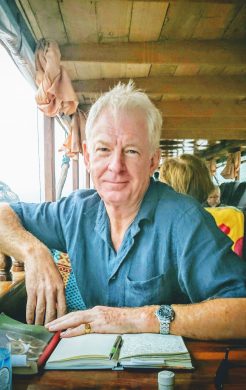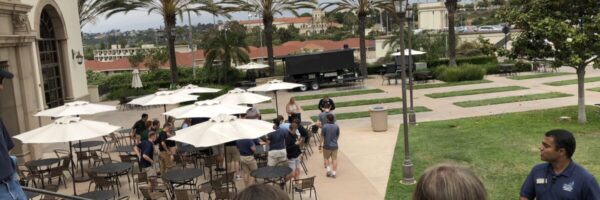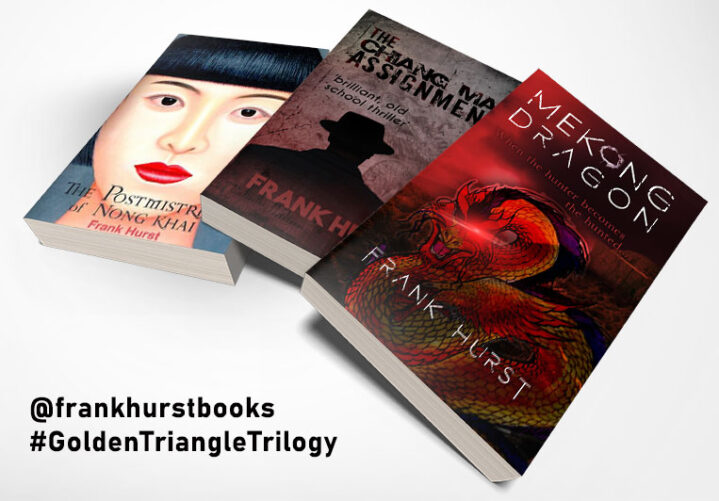
A writer’s story
Frank Hurst, who writes under a pseudonym, was born in London and spent thirty-six years as an investigator for HM Customs, Scotland Yard and the British Foreign Office.
He travelled widely in his career, including long spells in India, Thailand and the eastern Caribbean, tracking down some of the biggest traffickers in the world of drugs smuggling. He received the Outstanding Law Enforcement Award from the US Department of Justice for his work against Howard Marks, aka “Mr Nice” and has been a contributor to the recently published, Drug War – The Secret History by Peter Walsh. After leaving the service of the Crown, Frank has devoted his time to writing novels. His Golden Triangle Trilogy, set in the Far East, has received wide acclaim and won literary awards.
He now shares his time between his apartment in Phuket, a ramshackle hut in Isaan and a cottage in West Sussex. For a contemporary writer of fiction to reveal that he doesn’t read modern novels is a shocking admission, but in my case it’s a fact. Indeed, up until a few years ago I was not much into books at all. Now the opposite is the case. As a younger man I was too busy and too engrossed in my day job to give me space for proper reading. I certainly never envisaged writing a novel. The irony is that it was my job that eventually got me into scribbling – and Thailand. So, I can be doubly grateful for that. It’s a long story…
Growing up, I’d been encouraged to read. I’d flick my way wearily through some of the classic novels – school saw to that, but when I was old enough to choose my own books, I preferred historical non-fiction, mostly biographies about famous dead people. The Victorian explorers in particular fascinated me, both military and civilian. Travelling alone into distant lands, many sacrificed their lives for the, now rather out modish, concept of Queen and country. One book The Great Game by Peter Hopkirk made a big impression on me. It told the story of British and Russian spy networks in Northern India, Afghanistan and Central Asia. The fact that these were true accounts of people who had actually existed made the narrative even more spellbinding.
More recently, I’ve started to read a little more fiction but I’m a bit of a fuddy-duddy and like the old stuff the best. Graham Greene and George Orwell have been very inspirational. Their sentences are so simple but so descriptive at all sorts of levels. My love of the Far East has been a reoccurring theme and so I found Orwell’s first book Burmese Days brilliant to read – tragic and politically very thought provoking, and Greene’s The Quiet American set in French colonial Vietnam is simply wonderful. I think I modelled my anti-hero Mike Rawlin on the central character in that book to some extent – past his best, nervous about the future, willing to do bad things to get his own way. I really enjoyed The World of Suzie Wong by Richard Mason set in 1950s Hong Kong; the first story I know about a man falling in love with a bar girl – very sensitively written and it had a happy ending! But it’s with a sense of some embarrassment that I admit I hardly ever read modern crime novels – I should, of course, even if it’s just to see what the competition is up to!
How did it all start? A stroke of good fortune set me on the right path. I got very fluky in my early career. More by luck than judgement, and after flunking university, I was recruited into the investigation arm of HM Customs in London within weeks of joining the British Civil Service. They must have seen something in me that others had missed, including me. As a result, I spent the next nearly thirty or so years chasing criminals, mostly drugs traffickers, and often in some far-flung corners of the globe. I remember asking an ancient colleague, shortly after I’d joined the service in the late 70s, what opportunities there were to serve the Crown overseas. He shook his head gloomily and said “None whatsoever!” 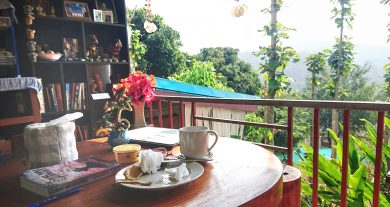
Fortunately for me, I managed to prove the old fellow wrong and after fifteen years cutting my teeth catching smugglers at Heathrow airport and Dover docks, I was sent to Thailand to try to develop intelligence about Howard Marks, perhaps the most famous British drugs smuggler of all time, who by then was running a big operation out of Bangkok. I was totally bowled over by Thailand and instantly recommended to London that we open an office there – with me in charge of course! I received a frosty response from senior management, but was allowed to continue my collaboration with the Thais and the other international law enforcement agencies working on the Marks case. Eventually in 1990 our efforts paid off, and between us, with the Americans in the vanguard of a huge global investigation, we managed to bring the notorious Welshman to justice. On the back of this success my office decided at last to open a full-time office in Bangkok but, perfidious as ever, they sent me to New Delhi instead. But that’s another tale…
One reason I have mentioned Howard Marks is that he was, despite his rather dodgy occupation, an inspiration to me. In two ways. The first was that he was a published author himself – he sold well over a million books, so I am told. A lot more than I am ever likely to. Which goes to show that notoriety may not necessarily be a bad thing… So, I thought, well if he can do it – not the drugs smuggling of course – why shouldn’t I have a go. Put the other side of the story in a way. It’s important to stress here, that my books are fiction even though the underlying premise is very real; whereas his were unashamedly autobiographical.
Secondly, Marks was very much a creature of his time, and although my villainous creation in the Postmistress of Nong Khai, the Dutch drugs smuggler Bart Vanderpool, is not inspired by Marks, a lot of what Marks did, gives life to the character. But not everything. For one thing, fictional Vanderpool is a heroin smuggler while Marks was a hashish man. And there is a difference believe me… Vanderpool and Marks share some things in common. Both were truly international, highly intelligent, charm personified with a coterie of followers in all the important drugs producing countries, including in Thailand. To his credit Marks never dealt in hard drugs, keeping himself strictly to weed, but he made a ton of money and had a lot of fun doing it. My character Bart Vanderpool is much more venomous and cold-blooded. Vanderpool is a heroin trafficker – Marks was not.
By the time the Marks case concluded with his twenty five year US gaol sentence, my love affair with Thailand was unstoppable, and I continued to visit in a professional capacity over the forthcoming years.
Although I never did get my dream job – in charge of the Bangkok office. I made sure my central character Mike Rawlin did! Writer’s privilege. My love affair with the country continues to this day, and I try to spend as much time here as I can. This is where I do the bulk of my writing. I have a particular love of the north of the Kingdom.
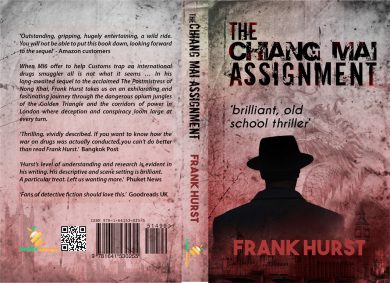
My drugs investigations took me to Chiang Rai, Mae Sae and beyond. Frontier towns have always fascinated me – maybe because of my job. The province of Chiang Mai is adjacent to the mountainous Golden Triangle jungles of Burma and Laos, which were once a no-go area and the source of a lot of opium and heroin back in the 70s, 80s and 90s. Now the region has largely cleaned up its act, and I have travelled back regularly since, most recently to research my books. The North East and the course of the mighty Mekong river (whose future sustainability due to China’s “dam politics” is a great worry to me), hold a particular attraction – such a joy – and so remote from the bustle and bright lights of Bangkok. Over time, I have developed a taste for Isaan food and in the remoter parts, I’m able to find the solitude and rural simplicity that enables me to write without distraction.
So, what are the stories about? They’re set thirty years ago in the murky and sometimes dangerous world of drugs smuggling – tales full of colourful characters, but essentially, they centre around three people. Mike Rawlin, a slightly past it, but dogged British Customs investigator on the trail of Bart Vanderpool, a dangerous Dutch heroin trafficker, and Lek, a beautiful Thai woman who finds herself in the middle of a huge criminal plot. Smuggler Vanderpool is a much younger man than his English adversary. He’s charismatic but cold and ruthless too. Although Rawlin is as tenacious as an old bulldog, and is the more likeable of the two men, he has some serious personal weaknesses and is prone to severe errors of judgement. These central characters dominate the plot as the men try to outsmart one another. As the story progresses their conflict turns to dislike, then hatred and by the end each is out to terminate the other man. There is a love rivalry too and the books are as much about the treacherous world of Thai drugs smuggling as they are about skulduggery in the corridors of power in London. I like to think that the settings and the plot are authentic. Many of the scenes actually happened to me – but some did not. Just as well really!
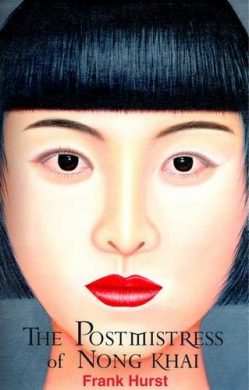 Once I got into the habit and developed a bit of discipline, the writing came fairly easily – it was hard work at times but hugely rewarding. I thought my troubles had ended when I smugly wrote “The End” as the last line of The Postmistress of Nong Khai. Little did I know that things were about to become much more difficult. The mysterious business of publishers, literary agents, publicists, media and all the rest who make up the world of books was a completely different and altogether more challenging experience… With my non-literary background, I was singularly unprepared for all the hoops and obstacles that confronted me when I finally started to think about how to get the book “out there”.
Once I got into the habit and developed a bit of discipline, the writing came fairly easily – it was hard work at times but hugely rewarding. I thought my troubles had ended when I smugly wrote “The End” as the last line of The Postmistress of Nong Khai. Little did I know that things were about to become much more difficult. The mysterious business of publishers, literary agents, publicists, media and all the rest who make up the world of books was a completely different and altogether more challenging experience… With my non-literary background, I was singularly unprepared for all the hoops and obstacles that confronted me when I finally started to think about how to get the book “out there”.
The first thing I did was actually quite sensible. I got the manuscript professionally edited. Then I got it proofread. Two different tasks as I found out. Both cost me money but it was a start and I felt I was making progress. Then I did a bit of research on the internet, joined the Society of Authors in the UK, and quickly realised how little I knew. It was not long before my boyish enthusiasm took a big hit. The universal advice I got was that it was virtually impossible to get a publishing company to even look at the book – there were so many established authors out there – “most of them younger than you, who have devoted their lives to getting their books published” … Oh dear!
“First, get a literary agent” they said. Easier said than done… I wrote to dozens and found myself spending more time writing letters of introduction, fiddling with synopses and attaching chapter drafts than I cared to think about, and I desperately wanted to start book two. I got some nice replies – encouraging lines but they all fell into the category of “not for us”. I persevered for a couple of months but there was a limit to the time I wanted to spend on it and I’m naturally impatient. I lost count of the times friends, trying to be helpful, reminded me how many rejection letters JK Rowling received before becoming a best-selling author. I enjoyed the creative stuff but trying to promote my work was repetitive administrative work – boring, and worse, demoralising.
Then someone told me about “partnership publishing”, which I was assured was not the same as self-publishing or as someone once said “vanity publishing”. I did a few internet searches and must have pressed all the wrong buttons because I started to get phone calls from all over the world from strange sounding people wanting to publish my book – and they hadn’t even read a single line. I became suspicious…
Finally, I found a UK publishing company who described themselves as a partnership publisher – Troubador Publishing, based in Leicester. I contacted them and they told me that if they liked the book, they would run with it but they needed to see it first. I would have to bear some of the costs, to cover their risk in the event the book flopped. I drove up to see them. They seemed very nice and professional, and asked me to send the draft. A couple of weeks later they wrote to say they liked it very much and would be delighted to publish it. The cost would be about two thousand US dollars plus a commission on sales… They said they would do the initial marketing and put it on Amazon, make it available to all the big UK book shops, register it at the British library, store the printed copies, design the cover, produce a kindle version etc, and promised that the end product would look really good. I dithered for a while and eventually said to myself, “why not?” I was fortunate to have some money from my pension fund and anyway I wanted to use my time more creatively.
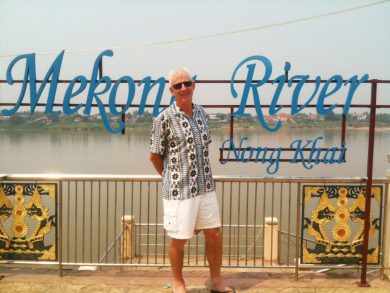
I paid extra for a publicist to run an extended marketing campaign. She got me a number of media interviews, including an appearance on BBC radio, some articles in the national and local press, a mention in British newspapers The Daily Telegraph and The Sun, for which I received a fee. But I never made the most of the early opportunities. For some obscure reason, I declined to do live radio interviews. TV appearances were out of the question… not that anyone was asking me then to do TV. This was a mistake. I’m not really sure what I was thinking. I was very new to the business, lacking in confidence and feeling my way – trusting no one… As you have read, my previous working environment had taken me into a world of secrecy and confidentiality. “Need to know” is a difficult mantra to shrug off overnight, and it came back to haunt me…
So, what happened next? Given the Thailand settings in the book, my publicist contacted the Thai press. The Bangkok Post, The Nation and other newspapers did reviews of the novels, all of which were favourable and Asia Books got in touch wanting to buy copies for their stores; but only if they could be printed in Thailand. I was introduced to George Gensbichler who runs a foreign language self-publishing company based in Bangkok, Booksmango, booksmango.com who I can highly recommend. He offered to publish the book in Thailand and on Amazon. More costs I’m afraid. I was well down the slippery slope, but I went for it – same principles applied – “only book I’ll ever write etc.”
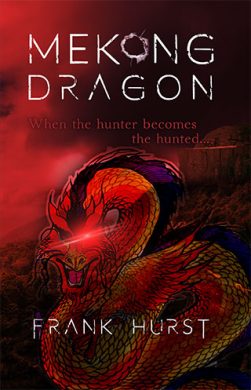 But of course, more books have followed and now The Postmistress of Nong Khai and The Chiang Mai Assignment are displayed on bookshelves at airports and bookshops all over Thailand – and via Amazon internationally and with other outlets in the UK. This, I admit, is a real thrill and I’m even beginning to feel like a bona fide author! The reviews so far have been pretty encouraging, and the books are starting to sell. Mekong Dragon, my latest and the final book in the Golden Triangle Trilogy, was published a few months ago and as always, I’m hopeful! I’ve begun to get a bit more relaxed about publicity and these days I’m prepared to do whatever anyone asks of me– within reason – I’m still a shy boy at heart, but now I’m happy to do live radio interviews and talks. I even did one for Phuket Radio last year!
But of course, more books have followed and now The Postmistress of Nong Khai and The Chiang Mai Assignment are displayed on bookshelves at airports and bookshops all over Thailand – and via Amazon internationally and with other outlets in the UK. This, I admit, is a real thrill and I’m even beginning to feel like a bona fide author! The reviews so far have been pretty encouraging, and the books are starting to sell. Mekong Dragon, my latest and the final book in the Golden Triangle Trilogy, was published a few months ago and as always, I’m hopeful! I’ve begun to get a bit more relaxed about publicity and these days I’m prepared to do whatever anyone asks of me– within reason – I’m still a shy boy at heart, but now I’m happy to do live radio interviews and talks. I even did one for Phuket Radio last year!
Embracing social media has been a challenge but I’ve made a start. I now have a website (www.frankhurst.com) and I’m on Twitter. I’m not convinced they are doing much good and whether the effort is actually worth it, but I intend to press on for the time being.
Would I do it again? Yes – in a heartbeat. The fact is I still enjoy the writing and the solitary time that allows me to be creative. The trilogy may be finished but I know I have more books in my head ready to be turned into print. What about the downsides? Well it’s true, I underestimated the hard slog and costs of promoting my work and getting the books into the global marketplace. I know the money to finance the books might run out one day, but I have learned along the way and am prepared to work as hard as I can to make the books a success. Maybe I’ll hook a literary agent one day – or even an old-style publisher… Pie in the sky maybe – but without hope what is there?
[email protected]
Twitter: Frank Hurst @frankhurstbooks


